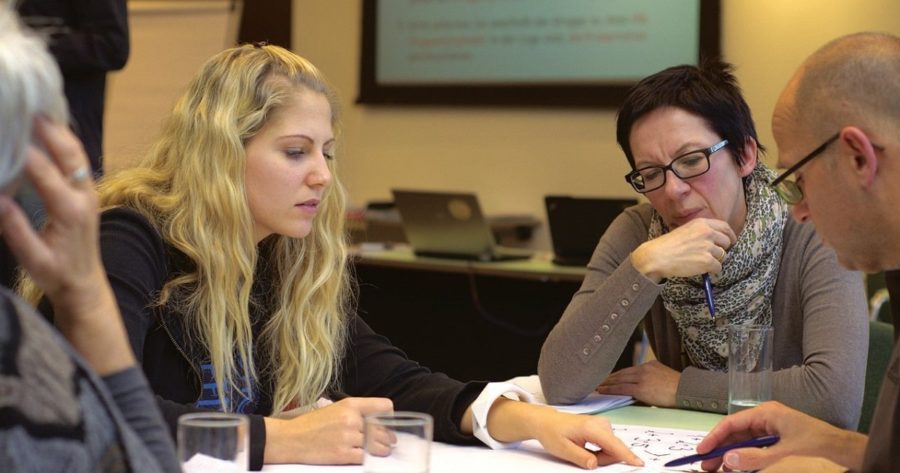Show You’re a Culture Fit—Just Don’t Over Do It
- Nick Kossovan
- The Art of Finding Work
- Western USA
- April 27, 2022

FIT! FIT! FIT!
I can’t stress enough the importance of an employer seeing you as one of them to being hired.
A few jobs back, while analyzing stats reports, my phone rang. It was Crocs’s Director of Talent Acquisition calling from the company’s head office in Boulder, Colorado. He’d come across a Pinterest board I’d created, ‘Brands that Have My Heart,’ and saw I included Crocs. He then checked out my LinkedIn profile. Turned out my background was a fit with a position he had open. (This is why you should keep your social media presence current and clean.)
I said, “Your call is like the mothership calling.” He laughed, and we had a great conversation resulting in my joining Crocs.
When interviewing, don’t underestimate the importance of making it clear you’re a culture fit. Ready for counterintuitive advice that’s worked for me? Adopt the attitude “Either I’m a fit, or I’m not,” and then just be who you are. Being someone you’re not, to fit in, never works in the long run.
My advice doesn’t mean you shouldn’t be strategic in making your interviewer see you’re a good fit. Here are three “I’m a fit” strategies to try:
1. Communicate you have the same values and passions.
Professing your undying love for the company doesn’t tell your interviewer whether you’ll actually fit in with the team and you’re someone others will want to be working with.
Research the company’s core values. Read its mission statement, ‘About Us’ page, and social media postings. Determine what the company cares about. Then ask yourself how it overlaps with your own career and personal experiences.
Now you can lead with something like, “I’m an avid camper; I love your tents, which is why I applied to be your next Director of Sales. I own your Giga Tent. Regardless of the weather, it’s never failed me. Your website mentions how Habitat Camping Gear’s mission is to embrace enjoying the outdoors in an environmentally friendly way. That resonated with me. Camping is how I unplug from the city. Like most campers, I’m environmentally conscious. Camping has minimal adverse effects on our environment compared to flying to a resort, which creates a large carbon footprint. “
2. Appear knowledgeable, not obsessed.
Think again if you believe showing over the top bubbly enthusiasm for the company’s products and/or services and “raison d’être” will give you an edge over your competition. (TIP: Every company’s reason for existence is to make a profit, therefore, speak to this as much as possible.)
Say you’re interviewing for a Senior Character Technical Animator position with Warner Bros. Your interview isn’t the place to give your rendition of Bug Bunny’s “Ehh, what’s up, doc?” or re-enact your favourite scene from Troy.
You want your interviewer to subtly notice your passion. Create a plan for what you’ll do once you get the job. Then share it and discuss Warner Bros.’s challenges and how your plan addresses those challenges.
This shows you’re interested in Warner Bros.’s success and you understand the problems they’re facing. You’re also showing what every employer looks for in a candidate, initiative. Candidates who present me with a plan of action are candidates I lean into.
3. Send a thank you note. That’s it!
I understand; you’re eager to hear about the status of your candidacy, and you want to prove you REALLY want the job. However, too much follow-up will work against you—you’ll look desperate, which is a turn-off.
Take a deep breath. On the same day of your interview, email a thank you note. (Yes, thank you notes do have influence.) Thank your interviewer for their time and offer more. Provide more information to a question you were asked, give feedback on recent news you read about the company, or ask a clarifying question. Then wait. Don’t follow up! (seriously) I don’t believe in chasing an employer; either they want you, or they don’t. No answer is an answer.
Two more “I’m a fit” strategies:
- Language usage is telling. Throughout your interview, use terminology specific to the job and industry.
- Every company has an unofficial way of dressing (READ: uniform). Before your interview, find out what it is and follow it. When I interviewed with Crocs, I wore my Crocs.
Joining a company whose culture is right for you should be what guides your job search. By balancing your enthusiasm with research, you’ll increase the likelihood of getting a job at a company where you feel you belong.
______________________________________________________________
Nick Kossovan, a well-seasoned veteran of the corporate landscape, offers advice on searching for a job. You can send Nick your questions at artoffindingwork@gmail.com.








